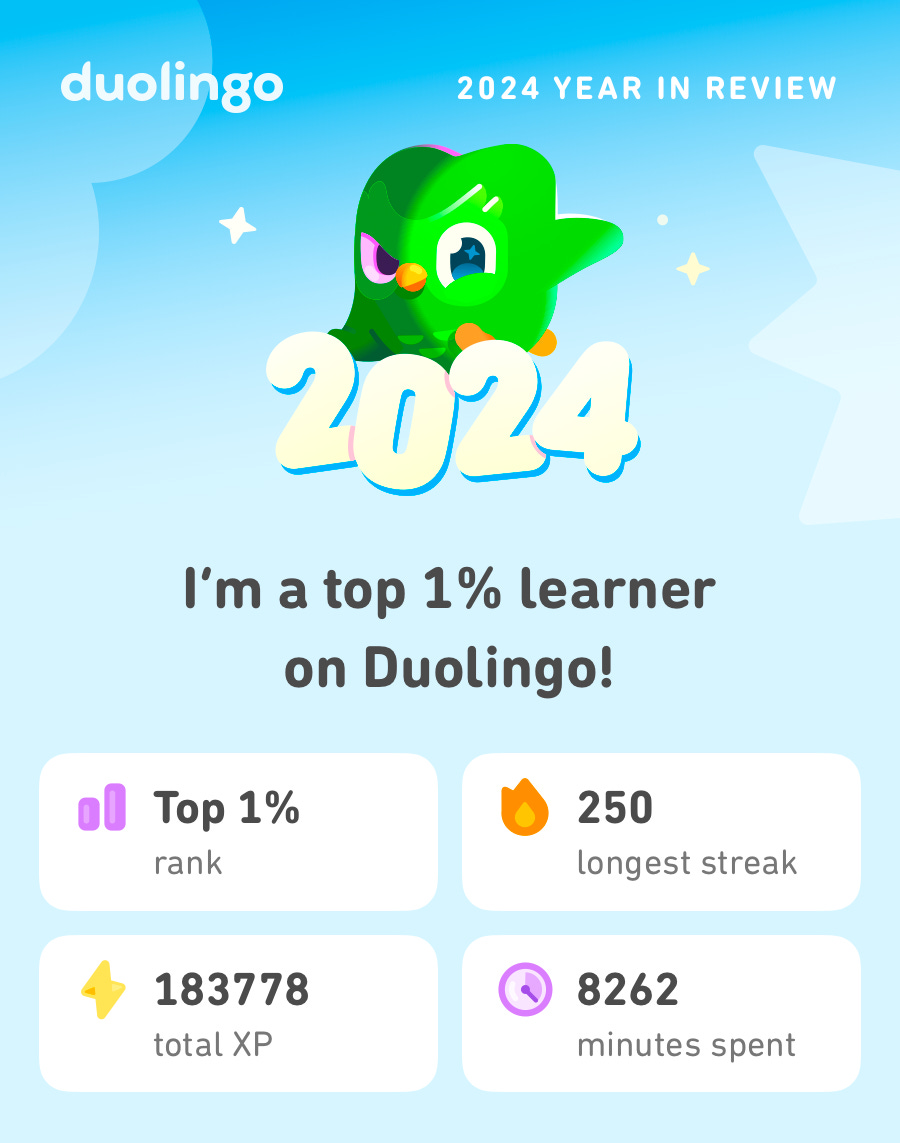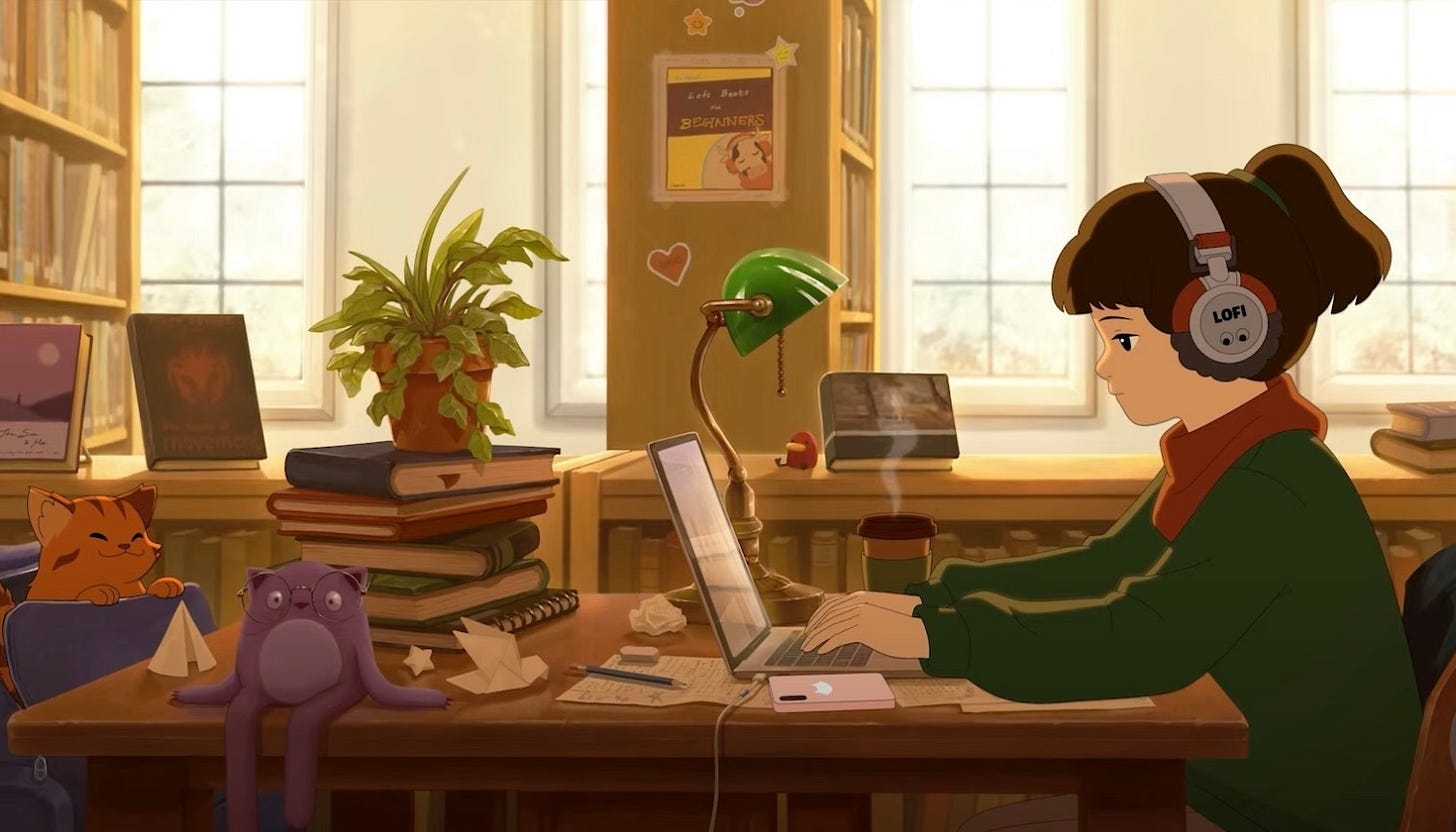The other day my friend’s 13 year old and I completely agreed [friend didn’t] that while the Kansas City Chiefs are allowed to rest all their starters and completely tank their game against the Broncos, it just isn’t fun to do that. Feels much more letter of the law than spirit, you know?
I love a game. I will compete over almost anything, and can be enticed to walk 10,000 steps just so my Garmin Lily vibrates and shows me little fireworks. If Lily is “proud” of me, I’m good. I dutifully do my Duolingo every day so I don’t miss a ‘streak’. While dad was in the hospital last fall I caught all the Pokemons that dared enter the room.
Feels like we are on a gamification upswing, doesn’t it? I’m not sure that most people know what it means, or how to gamify, or what even could be gamified. Duolingo is one of the better known examples - particularly with their enormous growth since Covid hit. [My friend Alexa is on day 1806 of her current streak] Language learning is a lot more fun, it turns out, with an owl mascot, daily streaks, XP challenges and sending high fives to your friends. Other apps are working on cash in on language gamification too - Fluyo earned $1.2M on Kickstarter, billing itself as the most fun way to learn a language. [According to the subreddit Language Learning it is not.]
I’m actually surprised there aren’t more tech firms selling gamification design. (Very much hoping for an onslaught of “you’re wrong” suggestions- I love a software demo) Of perhaps all things, this would be the most logical thing for schools to partner with an external organization. Spoiler - I refined my google search and found a bunch. None seem to really be what I was imagining. I’m not just talking about higher ed either, every workplace has some sort of learning involved - wouldn’t it be much more fun to learn about food safety or contract law if there was a game involved? [I’m an expert in neither of these, but they both seem game-worthy,]
I’ve been working on a book, and was talking with Glenda Morgan about conferences and how to provide an amazing learning experience. In her infinite wisdom Morgan said “I think we need a game.” [Ironically, Morgan actually hates games] Brilliant idea, and the egg of Build or Buy was hatched. Build or Buy is, as far as I can tell, the world’s only game where players build their own online degree programs. When I tell people about it the first question invariably is “did you build an app?” Perhaps more ironically, it’s not at all tech based - it’s a card and scoresheet game. It was created very intentionally to engage people together, without computers, to discuss and learn from the game and each other. The game last year at the University of Utah (thanks Deb and team)I created the game for the same reason I’ve been working on a book and I launched this Substack. I like learning stuff and I think too much. It turns out that playing the game is a fantastic way for university administrators [especially provosts and presidents] to learn about online learning without having to be put on the spot. I am now working on a student support board game now - can you get all your students through the morass of college? (Fun whether you’re in higher ed or not!]
So how can we do better in gamified learning? We can’t expect every professor to figure out how to gamify their courses - instructional designers may or may not have that particular skill set. Inside Higher Ed featured computer science Professor Yan Shi’s gamified class at UW Platteville - she redesigned it to offer quests for students,. Her class is now informally known as “dragon slayer.” We can’t expect everyone to be a software engineer, though. No, really though, she’s literally a software engineer.
We know that gamification works. We know from experience that we ourselves like gamified things. [Morgan also does Duolingo, so she can’t possibly hate all games.] I’ve been known to walk around my house to get those last Lily steps. Why aren’t we better at incorporating more gamification in learning? If there are seemingly endless gamified productivity apps launching [there are] being created, why aren’t we taking advantage of this in education and learning/design?
The first reason has to be the Professor Yan Shi problem, right? We aren’t all computer scientists. I spent way too long drawing a map on my iPad for a prior post, there is no way I’m going to be able to learn how to create a computer game.
I wonder if some of the desire for gamified tech learning can be attributed to generational difference. Although I refuse to use the term digital native, it cannot be denied that many of today’s traditional aged college students, at least, have been around a lot more tech growing up. When I studied Japanese in college you looked up characters by their stroke count in the biggest dictionary I’ve ever seen, just like the shogun wanted you to. The first iPhone was launched in 2007. I recently read about a gamified time management tool and had to investigate. I actually already know what a lofi girl is, but still was a bit lost. [If you’ve ever played the Yule Log on your TV, you’re halfway there!] For the sake of you, gentle reader, I dusted off [literally] my Surface Pro [circa 2013, still works] and signed up for Steam and bought Spirit City: Lofi Sessions. It’s actually it’s super hard for me to explain. It’s a virtual space where you build yourself as a character and you hang out. Your avatar can read or study or write or knit - mine likes to sit by the fire and drink coca in the winter upgrade. You also can collect little critters - I like the dust bunny best so far. [sentences you’ve never said before] Within the game you can set timers [maybe you need to study for 20 minutes and then take a break] and do a to-do list, checking things off as you go. Of course, for science, I signed up…. SCLS is what is referred to as a cozy game. Cozy mysteries, as opposed to violent thriller mysteries, are usually softer, often female led, gentler sort of stories. Cozy games have a gentle aesthetic - you’ll hear the word wholesome over and over again in descriptions.
What the team at Mooncube Games have created in Spirit City Lofi Sessions is pretty incredible. There is no “winning” this game - it’s more an experience, but really what it is is a time management tool. Game users are reporting again and again that it helps with ADHD and getting things done and productivity. If I were running a learning management system [Canvas, Blackboard, etc] I would be on the phone to Mooncube immediately - imagine placing SCLC within their education systems. It can be very hard to get people to log into these “tools” - I worked at a school where 70% of faculty had NEVER logged in, but if you add actual tools, and perhaps some fun, maybe they would.
Before I suggest gamifying sexual harassment training [that sounds weird!] I will say that at Washington State we had some of the most interesting training ever. An acting group came and acted out situations that might be inappropriate, and the audience could talk to them about what they did and what they should do. Far better than the stupid videos no one wants to watch - in fact, you could call it gamified.
So I have a couple more games I’m working on - will let you know when they are out. One is this student support board game - you have to help your students graduate. Lest you think it’s too higher ed, think about the game of Life. You’re not really getting married and having twin peg babies, but it’s still fun. The other game is my personal favorite - board game football. I worked with football at a couple of universities, and one of my favorite student athletes taught me a bunch of plays using paper dolls. The routes were never intuitive for me, but I never kick away the ball on 4th down and it’s always fun, win or lose! [Don’t tell the Chiefs that!]






